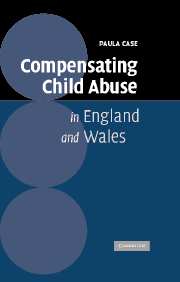1 - Law, Psychiatry, Society and Child Abuse
Published online by Cambridge University Press: 19 July 2009
Summary
Introduction
As will become apparent, the identification of child abuse is a multidisciplinary affair, drawing upon the combined but not necessarily compatible wisdom of medicine, law and sociology. This book seeks to provide an account of the journey of child abuse through the evolution of these different perspectives culminating in the legal, clinical and sociological discourse which prevails today. It is hoped that this discussion will serve as a useful backdrop and prelude to examination of the legal issues which have arisen in the context of abuse claims, and that it will assist in explaining judicial attitudes to abuse claims and some of the peculiar difficulties which abuse claimants face.
Evolving constructions of child abuse
The concept of child abuse has been described as ‘more like pornography than whooping cough’: in other words, it is a socially constructed phenomenon which reflects the operative values and opinions of a particular culture at a given point in time rather than an objectively defined occurrence. A striking example of this fact is the story of the Pitcairn Islanders recently convicted of having sex with adolescent girls from the age of 12. The case for the defence (although ultimately unsuccessful) was built upon the revelation that the practice of sex with adolescent girls on the islands had become the cultural norm and was an accepted ritual in Pitcairn Islands' society.
- Type
- Chapter
- Information
- Compensating Child Abuse in England and Wales , pp. 1 - 51Publisher: Cambridge University PressPrint publication year: 2007



